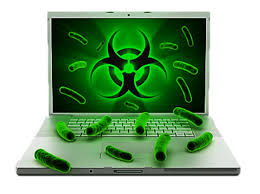A virus is a malicious software program that can infect your computer, replicate itself, and cause functional problems in your system. It is potentially harmful and can cause a loss of important data, besides corrupting your computer files.
Computer Viruses
Viruses may spread by attaching themselves in e-mails, instant messages, floppy disks, or pen drives, etc. They tend to corrupt your data, or even delete your important files. Anything and everything present on your hard drive can be erased by a nasty computer virus. These computer viruses are very smart. They tend to visit you, disguised as a greeting card, audio file, video file, or some other morphed entity.
When you are trying to download a software program or music file from the Internet, these computer viruses hide themselves in files, programs, and software, to get downloaded to your personal computer (PC). When you run a program file or boot sector program at boot time, they get activated.
The program infected by the virus gets modified, and begins to run the viral code. Soon, it takes control of your PC and begins to replicate and spread. They damage your files, and begin to delete programs and folders in your computer. Some viruses are time activated. They will activate themselves on a specified date, and begin creating havoc on your computer.
List of Common Viruses
Computer viruses have caused a loss of over USD 10 billion to many companies, as well as private users. The following list contains names of viruses that have infected and caused considerable damage to computer systems around the world:
Other Common Computer Viruses
These were some of the most common viruses you should watch out for. It is extremely important that you keep your antivirus software updated. Do not operate your computer, especially if you have an Internet-enabled one, without having one of the best antivirus software installed.
You should always install applications, only from reputed sources. Open emails only from trusted friends and acquaintances. If you have any doubt regarding the origin or content of the email, delete it immediately, without opening it. Click on links, only after you verify them. Notice the link address at the bottom of your browser, before clicking it. And most importantly, clear cookies and the cache of your web browser regularly.
Computer Viruses
Viruses may spread by attaching themselves in e-mails, instant messages, floppy disks, or pen drives, etc. They tend to corrupt your data, or even delete your important files. Anything and everything present on your hard drive can be erased by a nasty computer virus. These computer viruses are very smart. They tend to visit you, disguised as a greeting card, audio file, video file, or some other morphed entity.
When you are trying to download a software program or music file from the Internet, these computer viruses hide themselves in files, programs, and software, to get downloaded to your personal computer (PC). When you run a program file or boot sector program at boot time, they get activated.
The program infected by the virus gets modified, and begins to run the viral code. Soon, it takes control of your PC and begins to replicate and spread. They damage your files, and begin to delete programs and folders in your computer. Some viruses are time activated. They will activate themselves on a specified date, and begin creating havoc on your computer.
List of Common Viruses
Computer viruses have caused a loss of over USD 10 billion to many companies, as well as private users. The following list contains names of viruses that have infected and caused considerable damage to computer systems around the world:
- W32/Zafi-D
- W32/Netsky-D
- W32/Zafi-B
- Trojan.Lodear
- W32.Beagle.CO@mm
- Backdoor.Zagaban
- W32/Netsky-PW
- 32/Mytob-GH
- EXW32 Mytob
- W32/Mytob-AS
- W32/Mytob-BE
- W32/Mytob-C
- W32/Mytob-ER
- Stator, Asimov.1539, and Terrax.1069
- Elkern, Marburg, Satan Bug, and Tuareg
- Relax
- Randex
- CMJ
- Meve
- MrKlunky
- CIH
- I Love You Worm
- KAK
- PSWBugbear.B (worm)
- Lovgate.F (worm)
- Trile.C (worm)
- Sobig.D (worm)
- Mapson (worm)
- AnnaKournikova.jpg.vbs
- CAP
- Resume
- NYB
- Stoned Empire Monkey Virus
- Melissa.A
- Bablas
- O97M/Y2K
- Polyboot.B, AntiEXE
- Way
- Trj.Reboot
- Trivial.88.D
Other Common Computer Viruses
- Exploit-CVE2010-0814
- Exploit-CVE2010-2568
- Mal/Krap-I
- Mal/VB-LP
- Ms .NET JIT 3228
- Ms IE HO RCE 2746
- Ms Wind New Cl 3223
- Ms Wind TLSv1 3229
- Ms WindOTFont 2741
- MSFT Win SMB Val Vuln
- MSIL/Terdial.D
- Stuxnet
- Troj/Agent-PAP
- Troj/Agent-PAQ
- Troj/BredoZp-BH
- Troj/Cosmu-K
- Troj/FakeAV-BVP
- Troj/FakeAV-BVQ
- Troj/Mdrop-CZQ
- W32/AutoRun-BJS
- W32/Autorun.worm.q
- W32/VBMania@MM
- Exploit-CVE2010-0814
- Exploit-CVE2010-2568
These were some of the most common viruses you should watch out for. It is extremely important that you keep your antivirus software updated. Do not operate your computer, especially if you have an Internet-enabled one, without having one of the best antivirus software installed.
You should always install applications, only from reputed sources. Open emails only from trusted friends and acquaintances. If you have any doubt regarding the origin or content of the email, delete it immediately, without opening it. Click on links, only after you verify them. Notice the link address at the bottom of your browser, before clicking it. And most importantly, clear cookies and the cache of your web browser regularly.









